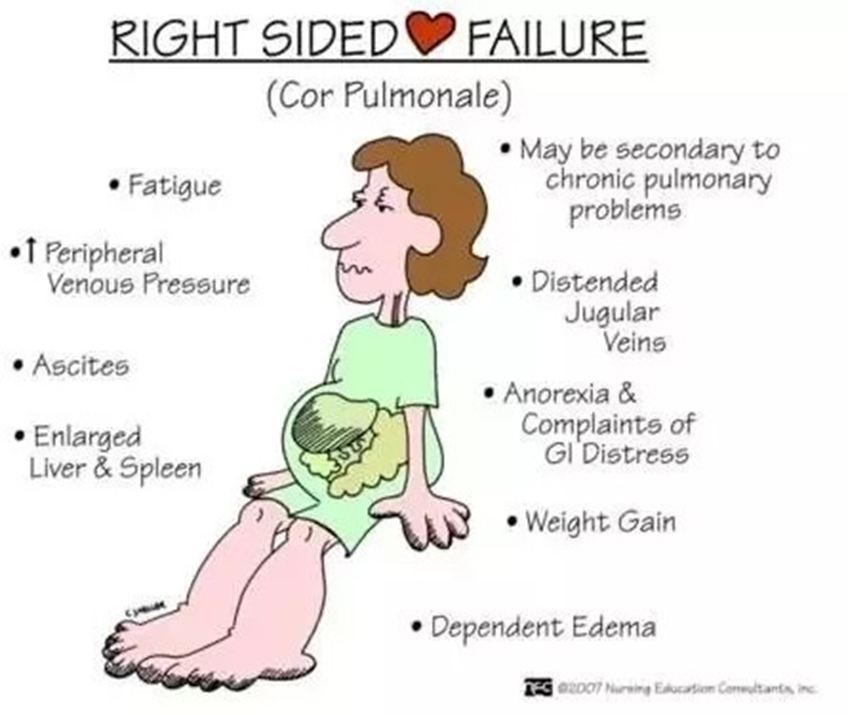In the context of a 65-year-old male patient diagnosed with chronic pulmonary disease and elevated pulmonary vascular resistance, which type of heart failure should the nurse assess for in this patient?
High-output heart failure.
Low-output heart failure.
Left heart failure.
Right heart failure.
The Correct Answer is D
Choice A rationale
High-output heart failure is not typically associated with chronic pulmonary disease and elevated pulmonary vascular resistance. High-output heart failure occurs when the heart is unable to meet the body’s increased demand for blood flow, which is not the case in this scenario.
Choice B rationale
Low-output heart failure is also not typically associated with chronic pulmonary disease and elevated pulmonary vascular resistance. Low-output heart failure occurs when the heart is unable to pump enough blood to meet the body’s needs, which is not the case in this scenario.
Choice C rationale
Left heart failure is not typically associated with chronic pulmonary disease and elevated pulmonary vascular resistance. Left heart failure occurs when the left side of the heart is unable to pump enough blood to the body, which is not the case in this scenario.
Choice D rationale
Right heart failure is the correct answer. In the context of a 65-year-old male patient diagnosed with chronic pulmonary disease and elevated pulmonary vascular resistance, the nurse should assess for right heart failure. This is because the right side of the heart pumps blood to the lungs, and if the pulmonary vascular resistance is elevated, it can put strain on the right side of the heart, leading to right heart failure.

Nursing Test Bank
Naxlex Comprehensive Predictor Exams
Related Questions
Correct Answer is A
Explanation
Choice A rationale
Smoking cigarettes can exacerbate the symptoms of Raynaud’s disease by causing further constriction of the blood vessels. Therefore, a patient who continues to smoke cigarettes may need further education about the management of Raynaud’s disease.
Choice B rationale
Eating bananas twice a day is not typically a concern for patients with Raynaud’s disease.
Choice C rationale
Wearing mittens outside, especially in cold weather, is a recommended strategy for managing Raynaud’s disease. It can help to prevent episodes of Raynaud’s by keeping the hands warm and reducing exposure to cold temperatures.
Choice D rationale
Taking calcium channel blockers is a common treatment for Raynaud’s disease. These medications help to relax and open up the small blood vessels in the hands and feet, reducing the severity and frequency of Raynaud’s episodes.
Correct Answer is D
Explanation
Choice A rationale
Elevating the leg above the level of the heart would not be beneficial in this case. This action would actually reduce blood flow to the leg, which is already compromised due to the arterial occlusion.
Choice B rationale
Exercising the leg would increase the oxygen demand of the tissues in the leg, which could exacerbate the problem. The tissues in the leg are already deprived of oxygen due to the arterial occlusion.
Choice C rationale
Applying a compression stocking to the leg would not be beneficial in this case. This action would further compromise blood flow to the leg, which is already reduced due to the arterial occlusion.
Choice D rationale
Keeping the patient in bed in the supine position is the correct action. This position will decrease the oxygen demand of the tissues in the leg and minimize ischemic damage until circulation can be restored.
Whether you are a student looking to ace your exams or a practicing nurse seeking to enhance your expertise , our nursing education contents will empower you with the confidence and competence to make a difference in the lives of patients and become a respected leader in the healthcare field.
Visit Naxlex, invest in your future and unlock endless possibilities with our unparalleled nursing education contents today
Report Wrong Answer on the Current Question
Do you disagree with the answer? If yes, what is your expected answer? Explain.
Kindly be descriptive with the issue you are facing.
